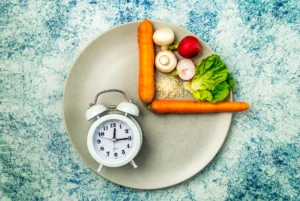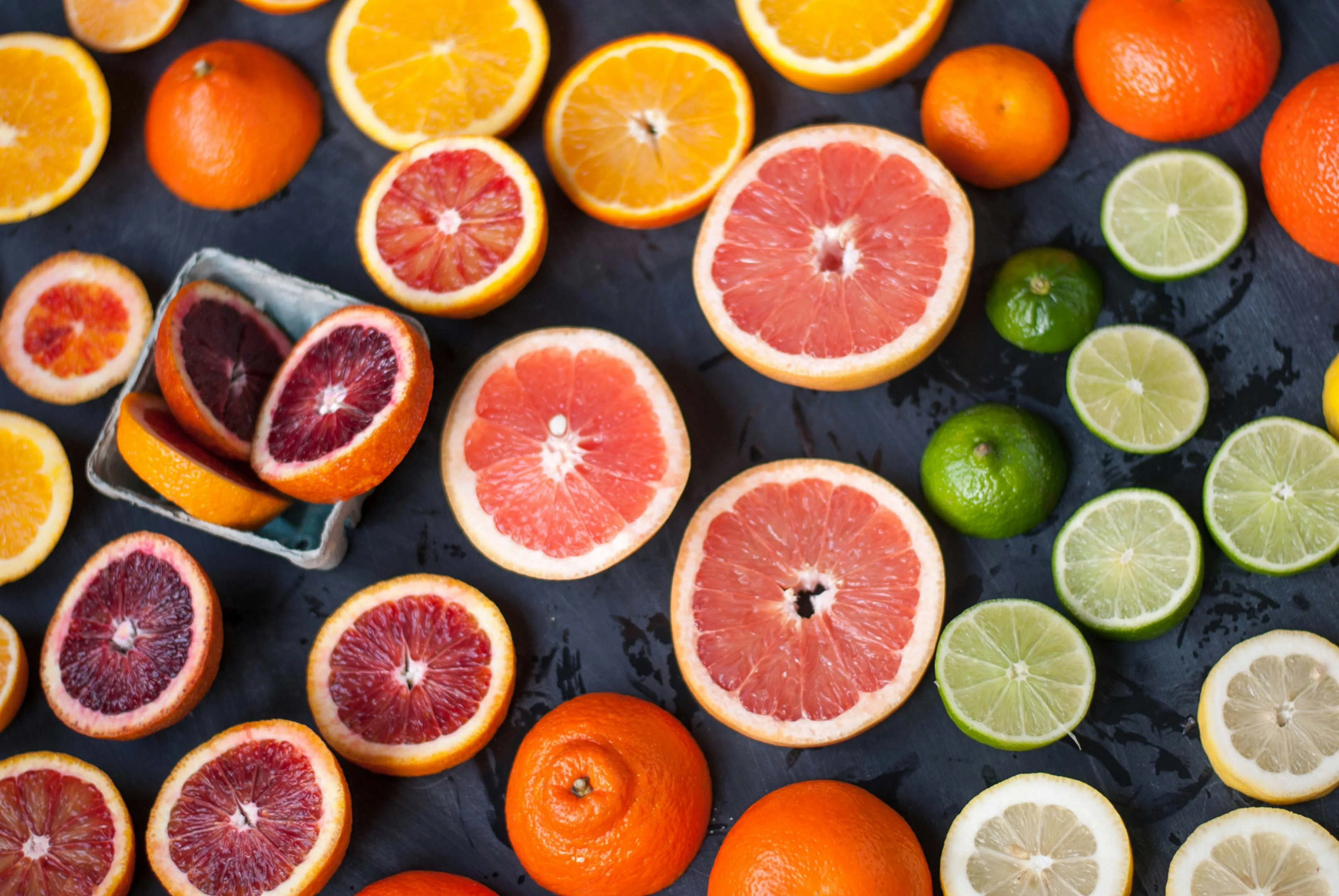
The Hidden Power of Fasting Intermittent: Unlock Natural Healing
Fasting intermittently is a popular way to improve health and wellness. It involves alternating between eating and fasting periods, allowing flexibility for those who want

Vitamin C is more than just a nutrient; it is a pillar of health and a foundation for our well-being. The remarkable thing about Vitamin C is it is readily available in a large portion of our daily foods! Most of the time, this is sufficient to meet your daily requirements and more! Just by eating a balanced and varied diet, you can get all the vitamin C your body needs every day.
Vitamin C has long been associated with protecting us from the common cold, and when it was discovered in 1932, it was primarily used to prevent scurvy in sailors. It now provides numerous health benefits, ranging from wound healing to infection prevention and even skin health, as it acts as an antioxidant, protecting the body from free radical damage. Incorporating vitamin C-rich foods into your diet will help you absorb enough iron to let your body function optimally. Welcome to our investigation into Vitamin C Food.This blog will cover what Vitamin C is, its numerous health benefits, and which foods have the highest concentrations of vitamin C to help you meet the recommended dietary allowance.

Vitamin C, ascorbic acid, or L-ascorbic acid is a water-soluble vitamin. It is essential for many physiological processes in the human body. It is essential for immune system support, wound healing, iron absorption, and antioxidant protection against free radical damage.
Vitamin C cannot be created in the body and must be supplied regularly by diet or supplementation. Tomatoes, citrus fruits, Brussels sprouts, strawberries, broccoli, kiwi, and bell peppers are all good sources of vitamin C.
Vitamin C is part of a variety of biochemical events in the body, including the creation of neurotransmitters, hormones, and certain enzymes.
Antioxidant Properties:
Vitamin C is an effective antioxidant that helps neutralize damaging free radicals, these are unstable chemicals that can cause oxidative damage to cells and contribute to aging and disease. Vitamin C, by scavenging free radicals, protects cells and promotes overall health.
Immune Support:
Vitamin C strengthens the immune system by increasing the activity of immune cells such as neutrophils, lymphocytes, and macrophages. It promotes the development of white blood cells, antibodies, and cytokines, all of which are required to combat infections and illnesses.
Collagen Synthesis:
Vitamin C is required for the production of collagen. This is a structural protein in connective tissues, skin, bones, and blood vessels. Collagen provides tissue strength and suppleness, facilitates wound healing, and helps maintain healthy skin, hair, and nails.
Wound Healing:
Vitamin C aids in wound healing by stimulating collagen synthesis and tissue repair. It promotes the creation of new blood vessels and strengthens the immunological response to injuries, therefore, accelerating the healing process.
Iron Absorption:
Vitamin C increases the absorption of nonheme iron, which is found in plant-based meals and iron supplements. Vitamin C promotes iron absorption in the intestines by converting it from ferric to ferrous form, which is especially advantageous for people who are at risk of iron deficiency or anemia.
Cardiovascular Health:
Vitamin C may promote blood vessel dilatation, reduce oxidative stress, and improve endothelial function. Consuming more Vitamin C or having higher blood levels of vitamin C may reduce the risk of heart disease and stroke.
Eye Health:
Vitamin C, along with other vitamins such as Vitamin E and beta-carotene, may help protect against age-related macular degeneration (AMD) and cataracts, two prevalent eye disorders that can cause vision loss. These strong antioxidants destroy free radicals and protect the eyes from oxidative damage.
What is the recommended dietary Vitamin C intake for an adult? How much Vitamin C do you need and how much is too much?
The Food and Nutrition Board of the National Academies of Sciences, Engineering, and Medicine created the Recommended Dietary Allowance (RDA) for Vitamin C, which offers basic limits for daily consumption.
Adults (aged 19 and up):
The RDA for Vitamin C is 90 milligrams per day for men and 75 milligrams per day for women. Pregnant women usually require 85 milligrams per day, while lactating mothers may need 120 milligrams per day.
Adolescents (14 to 18 years old):
The recommended daily allowance for Vitamin C for adolescents is 75 milligrams for both males and females.
Children (ages 1 to 13 years):
The recommended daily intake of Vitamin C varies with age. For example, children aged 4 to 8 years need 25 milligrams per day, whereas children aged 9 to 13 years need 45 milligrams per day.
Infants (ages 0 to 12 months):
The Adequate Intake (AI) of Vitamin C for infants is calculated depending on the average intake of healthy breastmilk. During the first year of life, newborns usually get enough Vitamin C from breast milk or infant formula. Breast milk contains Vitamin C, which rises as the infant gets older. However, the recommended intake for infants aged 7 to 12 months is 50 mg of Vitamin C each day.
However, more Vitamin C isn’t necessarily better for you. Your intestines absorb it, and once 1000mg is absorbed, it will be absorbed at 50% less capacity. When you ingest high doses, the excess is generally excreted causing no harm to the body. However, there are cases where higher Vitamin C intake has caused adverse effects, therefore it is advised to not exceed the daily recommended dosages.
Health professionals suggest that taking 2000 mg daily is the highest amount you can take without causing any risk to yourself. Taking more than 3000mg of Vitamin C creates kidney stones, especially for those with a chronic disease like kidney disease. People with gout find that uric acid starts to increase in their bodies if they take too much Vitamin C. It could also cause you to absorb too much iron in your blood.
Vitamin C deficiency, often known as scurvy, can arise as a result of a variety of causes that prevent appropriate Vitamin C consumption or absorption. Although it is not common, it can occur for various reasons.
Certain health conditions like kidney disease, malabsorption, or cancer can prevent the body from absorbing enough Vitamin C.
Additionally, certain medical problems that impact digestion or nutrient absorption can raise the risk of Vitamin C insufficiency. Examples include gastrointestinal disorders like Crohn’s disease, ulcerative colitis, and celiac disease, as well as ailments that alter the stomach lining or limit acid production.
The most prevalent cause of Vitamin C insufficiency is a diet low in Vitamin C-rich foods like fruits and vegetables. Individuals who consume a limited amount of fresh fruits and vegetables, especially those on restricted diets of less than 10mg a day of Vitamin C or with limited access to fresh produce, are at risk of Vitamin C insufficiency. This is when dietary supplements need to be used.
Passive and active cigarette smoking raises the body’s need for Vitamin C and hastens its depletion through oxidative stress. Smokers are more likely to have Vitamin C insufficiency than nonsmokers, even if they consume an adequate amount of Vitamin C.
Chronic alcohol intake can impair the absorption, usage, and storage of Vitamin C in the body. Alcoholics may have poor food habits and decreased nutritional absorption, which increases the risk of Vitamin C deficiency.
Low Vitamin C levels can result in low immune defense in the body so you are more prone to infections. Your recovery time will also be longer because your body isn’t able to cope as readily with the inflammation caused by infections.

Due to the inability to absorb enough iron, you may develop anemia. The degree of vitamin deficiency will determine how extreme the shortness of breath, tiredness, and feelings of weakness will be.
A deficiency in Vitamin C results in connective tissue not being made or incomplete. This results in wounds not being repaired properly and getting infected. Vitamin C is required for collagen formation, which is critical to blood vessel integrity. Deficiency can cause weaker blood vessels, which are more susceptible to bruising and bleeding, such as nosebleeds or gum bleeding.
Vitamin C helps to synthesize neurotransmitters like dopamine and norepinephrine, which regulate mood. Deficiency can cause irritation, sadness, and mood swings. This is an extreme emotional response to not feeling physically well and no matter how much rest is taken, it doesn’t make you feel any better.
An extreme lack of energy is felt when you have a deficiency in Vitamin C as it is needed to produce energy. Additionally, Vitamin C promotes the production of carnitine, a chemical essential in energy metabolism. Deficiency can cause weariness, weakness, and lethargy. This can hinder your daily life as you lack the strength and motivation to do anything.
Vitamin C aids in the creation of collagen, a protein that gives shape and strength to connective tissues, including joints. Deficiency can cause joint discomfort, stiffness, and edema. Additionally, Vitamin C deficiency can result in muscle weakness, pain, and tenderness.
Vitamin C deficiency can cause gingivitis, which is characterized by swollen, inflamed gums that bleed readily, especially while brushing or flossing. In severe cases of Vitamin C deficiency, it could cause a loss of collagen in the gums and jawbone, causing teeth to loosen or fall out.
Vitamin C supplements come in a variety of forms, including tablets, capsules, chewable tablets, powders, and liquid formulations. They are often used to enhance overall health and well-being, particularly in people who may not get enough Vitamin C from their diets or who have higher Vitamin C requirements owing to various reasons.
If you can’t get enough Vitamin C via food then you need to take a dietary supplement. Make sure you stick to the recommended dosage so that you don’t cause any harm to your body.
Taking more Vitamin C than you should could cause you to experience flatulence, stomach pain, and diarrhea. These symptoms will pass once you stop taking dietary supplements.
Vitamin C is in a lot of vegetables and fruits, however, the doses vary. It’s important to note that heat and light are enemies of this vitamin. So ensure you are cooking your food at the right temperature. Steaming, blanching, and stir-frying are good ways of preserving the Vitamin C content in foods, but it is best to eat them raw.
Citrus fruits are known for being great sources of Vitamin C and there are so many to choose from. Lemons, oranges, grapefruit, lemons, and limes are full of Vitamin C.
Here are the amounts of Vitamin C in common citrus fruits:
Grapefruit – 96 mg
Orange – 83 mg and a cup of orange juice contains 71mg
Lemon – 45 mg
Lime – 30 mg

Tropical fruit are not just attractive with their bright colors but they are full of Vitamin C, other vitamins, antioxidants, and minerals. Their nutritional value makes them vital for overall health.
Guavas
Guavas have lycopene which is an antioxidant as well as dietary fibers to make the immune system stronger and aid in the digestive process. One guava has 125 mg of Vitamin C, found especially in the rind.
Kiwi Fruit
One medium kiwi fruit has 68,5 mg of Vitamin C and contains Vitamins E, and K, and dietary fibers. This fruit is great for the immune system and can decrease the risk of stroke and blood clots.
Acerola Cherries
These particular cherries contain a lot of polyphenols which are plant micronutrients that guard the body from oxidative stress. It also benefits cardiovascular health and helps to decrease inflammation in the body. Vitamin C concentration of an Arcela cherry varies depending on its size and ripeness. However, one average-sized Arcela cherry may contain between 80 and 100 milligrams of Vitamin C. This varies slightly depending on the cultivar and growth conditions.
Papayas
This fruit full of antioxidants and is also has a great Vitamin C content. Just 100 grams of raw papaya normally contains 60-80 milligrams of Vitamin Additionally it also contains a digestive enzyme called papain, which breaks down proteins to ensure efficient digestion.
Tomatoes
Tomatoes are a perfect example of how cooking methods can alter the Vitamin C content.
A cup of raw tomatoes can contain 15 to 20 milligrams of Vitamin C, compared to a cup of cooked tomatoes, depending on the cooking method and duration, the Vitamin C content can range from 5 to 10 milligrams per cup.
Strawberries
On average, one cup of strawberries contains about 85 milligrams of Vitamin C. However, the exact Vitamin C concentration may differ slightly depending on the size and maturity of the strawberries.
Strawberries are also full of antioxidants and flavonoids. This fruit has been linked with improving cardiovascular health and diabetes.
Cantaloupe
On average, one cup of diced cantaloupe which is around 160 grams, contains roughly 36 milligrams of Vitamin C. This makes cantaloupe a moderate source of Vitamin C. While cantaloupe may not contain as much Vitamin C as other fruits such as strawberries or oranges, it nevertheless contributes significantly to your daily intake of this crucial component. Cantaloupe also contains a variety of vitamins, minerals, and antioxidants, such as Vitamin A, potassium, and beta-carotene, all of which provide health advantages.
Black Currants
Black currants have very high Vitamin C content, making them one of the most abundant natural sources of this nutrient. These dark fruits are not just high in Vitamin C but also have antioxidants that decrease oxidative damage caused by cardiovascular disease, neurodegenerative diseases, and cancer. On average, one cup of fresh black currants which is around 112 grams, contains an average of 200 milligrams of Vitamin C.
Rose Hips
Not many people realize that certain roses create a tangy, small, and sweet fruit filled with vitamin C. 100g of rose hips has 300-1300 mg of Vitamin C, making it a great choice for Vitamin C.

Chili Peppers
The amount of Vitamin C depends on the color of the pepper. One red chili pepper contains 65 mg of Vitamin C, whereas, green chili peppers have 109 mg of Vitamin C.
Brussel Sprouts
Brussels sprouts are a cruciferous vegetable rich in Vitamin C. A cup of cooked Brussels sprouts contains more than 90 milligrams of vitamin C, as well as fiber, vitamins, and minerals.
Bell peppers
The amount of vitamin C in bell peppers increases as the vegetable ripens. So while one cup of green bell peppers is 80 mg, the same amount of yellow bell peppers is 184 mg and red bell peppers is 142 mg.
Broccoli
One cup of chopped, cooked broccoli contains 51 mg. This cruciferous vegetable is also linked with lowering the risk of cancer.
Kale
Cooked or raw, these cruciferous vegetables are high in Vitamin C. One cup of cooked kale contains 23 mg and one cup of raw kale contains 93 mg.
Purple or Red Cabbage
This vegetable falls into the cruciferous vegetable category because of its cross-shaped flowers. Half a cup of cooked purple or red cabbage contains 50 mg of Vitamin C.
Mustard Greens or Mustard Spinach
One cup of uncooked mustard spinach has 195 mg of Vitamin C. It also contains fiber, Vitamin A, calcium, and potassium.
Vitamin C is an essential daily vitamin for brain health, strong bones, connective tissue, hair, and skin. It also improves wound healing and immunological function.
There are many vitamin C-rich foods to pick from, including bright bell peppers and leafy greens, as well as tropical fruits like kiwi and papaya. Berries with high vitamin C concentrations include strawberries, black currants, and raspberries. Even spicy chili peppers can help you get enough of this crucial vitamin every day.
Your body needs Vitamin C to perform optimally to protect you from free radicals and chronic disease such as cardiovascular disease. That’s why it is so important that you ensure your diet is rich in Vitamin C foods.
We empower ourselves to live and develop, one nutrient-packed mouthful at a time, this can be done by eating a well-balanced diet, rich in vitamin C, and following healthy lifestyle choices. We hope you have all the information you need to take that first step toward preventing disease and maintaining a healthy and fulfilling life.

Fasting intermittently is a popular way to improve health and wellness. It involves alternating between eating and fasting periods, allowing flexibility for those who want

Gluten-free lifestyles might seem intimidating, particularly if you’re just getting started. All sorts of tasty and healthy options that you may not have thought of

Basic Health for Men: A Gentle Guide for a Better Lifestyle Health for men is a topic that is often overlooked because there are more

The Power of A Digital Detox: Revitalizing Your Life A digital detox is needed now more than ever, as digital devices are our most valuable

The Role of Chlorine Dioxide in Holistic Healing: Alternative Therapies Chlorine dioxide (CDS), also known as the miracle solution, has been underestimated for many years.

A vertigo dizziness remedy can be difficult to find as vertigo can be an unsettling experience. This often leads to a spinning sensation and feeling


This website or its third-party tools use cookies, which are necessary for its functioning and required to achieve the purposes illustrated in the cookie policy. You accept the use of cookies by closing or dismissing this notice, by clicking a link or button or by continuing to browse otherwise.